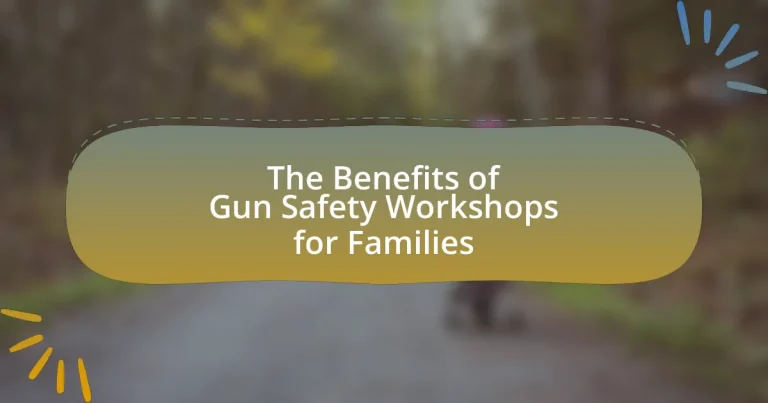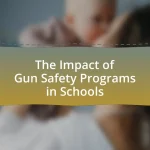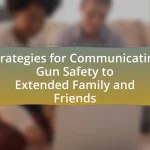Gun Safety Workshops for Families are educational programs aimed at teaching families the safe handling, storage, and use of firearms. These workshops cover critical topics such as secure gun storage, recognizing firearm risks, and effective communication about gun safety within the family. Research shows that participation in these workshops significantly reduces the likelihood of accidental shootings and promotes responsible gun ownership. Conducted by certified instructors and organizations specializing in gun safety, these workshops provide families with essential skills and knowledge to foster a safer home environment. The article will explore the benefits, key topics covered, and resources available for families seeking to participate in gun safety workshops.
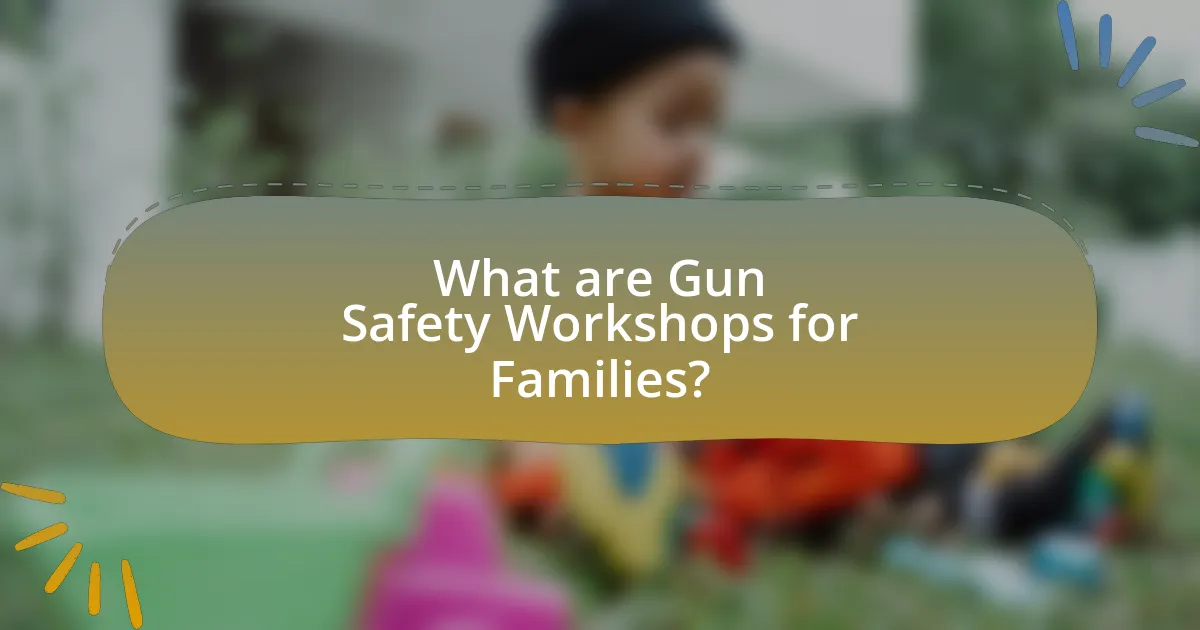
What are Gun Safety Workshops for Families?
Gun Safety Workshops for Families are educational programs designed to teach families about the safe handling, storage, and use of firearms. These workshops typically cover essential topics such as the importance of secure gun storage, recognizing the risks associated with firearms, and strategies for communicating about gun safety within the family. Research indicates that families who participate in such workshops are more likely to implement safe practices, reducing the risk of accidental shootings and promoting responsible gun ownership. For instance, a study published in the Journal of Community Health found that families who attended gun safety training reported a 43% decrease in unsafe firearm handling incidents.
How do Gun Safety Workshops benefit families?
Gun safety workshops benefit families by providing essential education on safe firearm handling and storage practices. These workshops equip family members with knowledge about the risks associated with firearms, thereby reducing the likelihood of accidental shootings and promoting responsible gun ownership. According to the National Safety Council, proper education and training can significantly decrease the number of unintentional firearm injuries, highlighting the importance of such workshops in fostering a safer home environment.
What key topics are covered in Gun Safety Workshops?
Gun Safety Workshops cover essential topics such as safe handling of firearms, proper storage techniques, understanding the mechanics of guns, and the legal responsibilities of gun ownership. These workshops emphasize the importance of educating participants on how to prevent accidents and promote responsible gun use. Research indicates that structured training can significantly reduce the risk of firearm-related incidents, highlighting the effectiveness of these workshops in fostering a culture of safety among families.
Who typically conducts these workshops?
Gun safety workshops are typically conducted by certified firearms instructors, law enforcement professionals, and organizations specializing in gun safety education. These individuals possess the necessary expertise and training to effectively teach families about safe firearm handling and storage practices. For instance, organizations like the National Rifle Association (NRA) and the Eddie Eagle GunSafe Program provide structured training led by qualified instructors, ensuring that participants receive accurate and reliable information on gun safety.
Why are Gun Safety Workshops important for families?
Gun Safety Workshops are important for families because they provide essential education on safe firearm handling and storage practices. These workshops equip family members, especially children, with the knowledge to recognize and avoid dangerous situations involving firearms. According to the National Safety Council, unintentional shootings can be significantly reduced through proper education and awareness, highlighting the effectiveness of such workshops in preventing accidents. Furthermore, studies show that families who participate in gun safety training are more likely to implement safe storage practices, thereby decreasing the risk of firearm-related incidents in the home.
What statistics support the need for Gun Safety Workshops?
Gun safety workshops are essential due to alarming statistics indicating the prevalence of firearm-related incidents. In the United States, approximately 4.6 million children live in homes with at least one loaded and unlocked firearm, according to a 2021 study by the American Academy of Pediatrics. Furthermore, the Centers for Disease Control and Prevention reported that in 2020, there were over 24,000 firearm-related deaths among individuals aged 1 to 19, highlighting the urgent need for education on safe gun handling and storage practices. These statistics underscore the critical importance of gun safety workshops in preventing accidental shootings and promoting responsible firearm ownership.
How do these workshops address common misconceptions about gun safety?
These workshops address common misconceptions about gun safety by providing evidence-based education and practical demonstrations. Participants learn that many beliefs, such as the idea that guns are inherently safe when stored unloaded, are misleading; statistics show that improper storage increases the risk of accidental discharges. Workshops also clarify that children are often curious about firearms, and teaching them safe handling practices can significantly reduce the likelihood of accidents. By engaging families in discussions and hands-on activities, these workshops effectively dispel myths and promote a culture of responsible gun ownership.
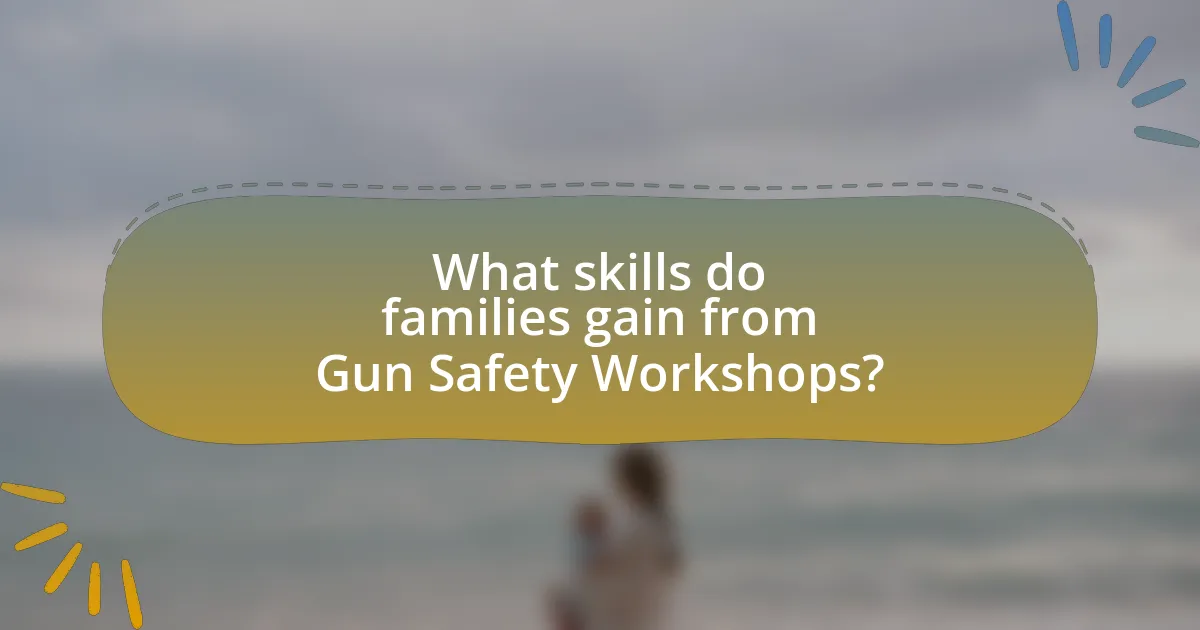
What skills do families gain from Gun Safety Workshops?
Families gain critical skills in firearm handling, safe storage practices, and emergency response from Gun Safety Workshops. These workshops educate participants on the importance of treating firearms as if they are always loaded, ensuring that they understand the fundamental rules of gun safety. Additionally, families learn how to securely store firearms to prevent unauthorized access, particularly by children. Emergency response training, including how to react in a crisis involving a firearm, is also a key component, equipping families with the knowledge to handle potentially dangerous situations effectively. Research indicates that communities with access to gun safety education experience lower rates of accidental shootings and firearm-related injuries, underscoring the effectiveness of these workshops in promoting safety.
How do families learn to handle firearms safely?
Families learn to handle firearms safely primarily through structured gun safety workshops. These workshops provide comprehensive education on firearm handling, storage, and safety protocols, often led by certified instructors. Research indicates that participation in such workshops significantly reduces the risk of firearm accidents; for instance, a study published in the Journal of Injury Prevention found that families who attended gun safety courses reported a 43% decrease in unintentional firearm injuries. Additionally, these workshops often include hands-on training, which reinforces safe practices and builds confidence in handling firearms responsibly.
What practical exercises are included in the workshops?
The practical exercises included in the workshops focus on hands-on training in safe firearm handling, storage practices, and emergency response scenarios. Participants engage in activities such as demonstrating proper loading and unloading techniques, practicing safe storage methods, and role-playing emergency situations to reinforce learned skills. These exercises are designed to enhance participants’ understanding of gun safety and ensure they can apply these principles effectively in real-life situations.
How do workshops teach conflict resolution related to firearms?
Workshops teach conflict resolution related to firearms by providing participants with skills to manage and de-escalate potentially dangerous situations involving guns. These workshops often include role-playing scenarios, communication techniques, and strategies for recognizing and addressing conflicts before they escalate. For instance, studies have shown that training in conflict resolution can reduce the likelihood of violent encounters, as participants learn to navigate disagreements without resorting to aggression. Additionally, workshops may incorporate discussions on the legal and ethical responsibilities of firearm ownership, reinforcing the importance of safe practices in conflict situations.
What role does communication play in Gun Safety Workshops?
Communication is essential in Gun Safety Workshops as it facilitates the effective transfer of critical safety information and fosters an environment of trust and engagement among participants. Clear communication ensures that participants understand safety protocols, the importance of responsible gun ownership, and the potential risks associated with firearms. Research indicates that workshops that prioritize open dialogue and interactive discussions lead to higher retention of safety practices, as participants are more likely to engage with the material and ask questions. For instance, a study published in the Journal of Safety Research found that workshops incorporating role-playing and scenario-based discussions significantly improved participants’ ability to recall safety procedures compared to traditional lecture formats. Thus, effective communication not only enhances learning outcomes but also promotes a culture of safety within families.
How can families improve their communication about gun safety?
Families can improve their communication about gun safety by participating in structured gun safety workshops. These workshops provide a platform for families to engage in open discussions about the importance of gun safety, establish rules, and share personal experiences. Research indicates that families who attend such workshops report increased knowledge and confidence in discussing gun safety, leading to more effective communication. For instance, a study by the National Shooting Sports Foundation found that 87% of participants felt more comfortable discussing gun safety after attending a workshop, highlighting the effectiveness of these educational programs in fostering dialogue within families.
What strategies are taught for discussing firearms with children?
Strategies taught for discussing firearms with children include using age-appropriate language, emphasizing safety, and encouraging open dialogue. These strategies help children understand the dangers associated with firearms while fostering a safe environment for questions. Research indicates that children who receive education on gun safety are less likely to engage in risky behaviors, as highlighted in studies by the National Shooting Sports Foundation, which found that structured discussions significantly reduce the likelihood of firearm-related accidents among children.
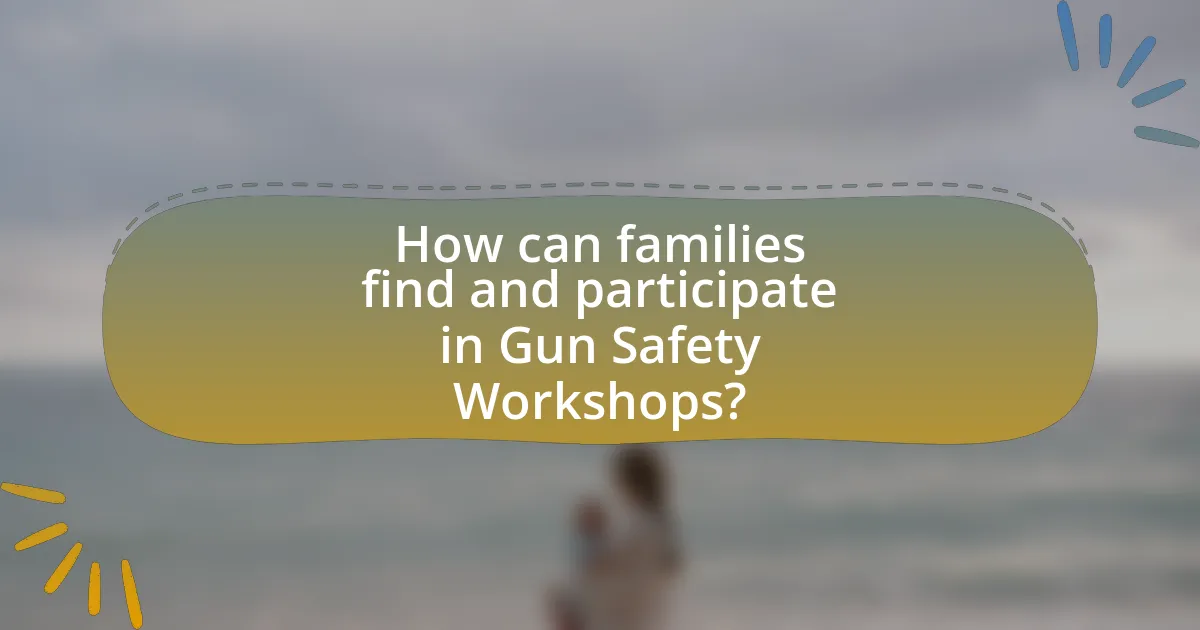
How can families find and participate in Gun Safety Workshops?
Families can find and participate in Gun Safety Workshops by searching online for local organizations, community centers, or gun ranges that offer these programs. Many reputable organizations, such as the National Rifle Association (NRA) and the Eddie Eagle GunSafe Program, provide resources and listings of workshops available in various regions. Additionally, families can check with local law enforcement agencies, which often host or promote gun safety events. Participation typically involves registering for the workshop through the hosting organization’s website or by contacting them directly for details on scheduling and fees.
What resources are available for locating Gun Safety Workshops?
Local gun safety workshops can be located through various resources, including the National Rifle Association (NRA), local law enforcement agencies, and community centers. The NRA offers a comprehensive directory of certified instructors and workshops across the United States, making it a reliable source for finding training opportunities. Additionally, many local police departments provide information on community outreach programs that include gun safety training. Community centers often host workshops in collaboration with these organizations, providing accessible options for families.
How can families assess the quality of a Gun Safety Workshop?
Families can assess the quality of a Gun Safety Workshop by evaluating the credentials of the instructors, the comprehensiveness of the curriculum, and participant feedback. Instructors should have relevant certifications and experience in firearm safety, ensuring they are knowledgeable and capable of delivering accurate information. A comprehensive curriculum should cover essential topics such as safe handling, storage practices, and emergency response, aligning with guidelines from organizations like the National Rifle Association. Additionally, families can review feedback from previous participants to gauge the effectiveness and engagement level of the workshop, as positive testimonials often indicate a high-quality experience.
What are the costs associated with attending these workshops?
The costs associated with attending gun safety workshops for families typically range from $25 to $150 per participant. These fees often cover materials, instruction, and sometimes refreshments. For example, a workshop organized by a recognized safety organization may charge $50, which includes a comprehensive training manual and access to expert instructors. Additionally, some workshops may offer discounts for families or groups, making them more accessible.
What are some best practices for families after attending a Gun Safety Workshop?
Families should implement regular discussions about gun safety and establish clear rules regarding firearm access after attending a Gun Safety Workshop. Engaging in ongoing conversations reinforces the principles learned during the workshop and ensures that all family members understand the importance of safe practices. Additionally, families should practice safe storage techniques, such as using locked cabinets or safes for firearms, which is crucial for preventing unauthorized access, especially by children. According to the National Safety Council, secure storage can significantly reduce the risk of accidental shootings and unauthorized use. Lastly, families should participate in periodic refresher courses or training sessions to stay updated on best practices and reinforce their commitment to gun safety.
How can families reinforce the lessons learned in the workshop at home?
Families can reinforce the lessons learned in the workshop at home by implementing regular discussions about gun safety and practicing the skills taught during the session. Engaging in open conversations about the importance of safe gun handling, storage, and emergency procedures helps to solidify the knowledge gained. Additionally, families can create a safety plan that includes specific actions to take in various scenarios, ensuring that all members understand their roles. Research indicates that consistent reinforcement of safety practices at home significantly reduces the risk of accidents, as families who actively engage in safety discussions are more likely to adopt responsible behaviors.
What ongoing resources can families utilize for continued education on gun safety?
Families can utilize various ongoing resources for continued education on gun safety, including online courses, community workshops, and educational materials from reputable organizations. The National Rifle Association (NRA) offers the Eddie Eagle GunSafe Program, which provides resources for teaching children about gun safety. Additionally, the National Shooting Sports Foundation (NSSF) provides educational materials and safety programs aimed at families. Research indicates that consistent education and engagement in gun safety practices significantly reduce the risk of firearm accidents in homes with children.
